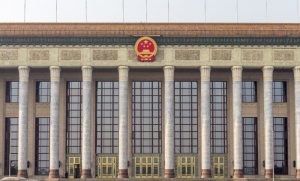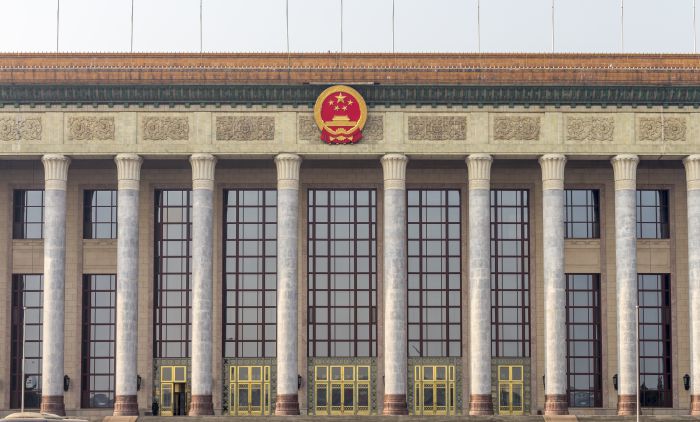Are anti-corruption reforms effective in reducing economic rent seeking and constraining the influence of special interests? New research from Tsinghua University PBC School of Finance finds that anti-corruption investigations in China are associated with credit reallocation from less productive state-owned enterprises (SOEs) to more productive non-SOEs. The series of investigations constitute staggered events to identify the causal impact of anti-corruption reforms on bank financing.

There has been a fierce debate about whether the anti-corruption campaign in China is beneficial or detrimental to the economy. A Financial Times article on January 4, 2017, discussed the political price of President Xi Jinping’s anti-corruption campaign and whether Beijing’s claim of “huge progress” is overblown. Between 2010 and 2015, the number of government officials prosecuted for graft rose from around 5,000 per year to peak at 14,000.
Some have argued that the campaign could have a superficial or negative impact, with lower-level officials preferring to enjoy a quiet life instead of working diligently. Furthermore, the anti-corruption campaign might lead to increases in bribery costs and subsequently inhibit “normal” economic activity. We use China as our research setting since these anti-corruption events provide an ideal laboratory to study the causal relation between anti-corruption reforms on bank financing given the intensive investigations and disruptions of political connections.
In our paper, “China’s Anti-Corruption Campaign and Credit Reallocation from SOEs to Non-SOEs,” we provide empirical evidence that the anti-corruption campaign does have a positive impact on the economy, in terms of shifting credit from less productive state-owned enterprises (SOEs) to more productive non-state- owned enterprises (non-SOEs), as shown in Figure 1. Our paper documents that the anti-corruption campaign leads to increases in financing capacity for productive, non-SOE rivals, due to bankers’ active role in corporate financing. The credit reallocation towards non-SOEs during the anti-corruption campaign contrasts sharply with the stylized fact that SOEs received preferential treatment in bank lending unconditionally during normal times, as illustrated in Figure 2.

In other words, the anti-corruption campaign does have a positive impact on the economy, in terms of shifting credit from less productive SOE peers to more productive non-SOE peers.
|
The anti-corruption campaign does have a positive impact on the economy, in terms of shifting credit from less productive SOE peers to more productive non-SOE peers. |
As well established in literature, SOEs in China receive preferential treatment in bank lending (e.g., Brandt and Zhu, 2001; Boyreau-Debray and Wei, 2005; Song, Storesletten, and Zilibotti, 2011; Cong, Gao, Ponticelli, and Yang, 2017). There is a stylized fact that SOEs received preferential treatment in bank lending unconditionally during normal times, as illustrated in Figure 2. Brandt and Zhu (2001) documented credit repression in China whereby banks ration cheap credit in favor of less productive SOEs, which enjoy implicit government guarantees.
Most policy-industry research focuses on the macroeconomic trend or market-level evidence associated with the anti-corruption campaign, which seems to coincide with the economic slowdown in China. However, these macro or market trends are not separately identifiable from other alternative explanations, for example: (1) cyclical slowdowns of global growth and international trade, (2) structural changes in the Chinese economy like population aging, and (3) macroeconomic policy, especially fiscal stimulus, that favors SOEs versus non-SOEs. In contrast, we provide firm-level evidence by examining whether investigated industries experience credit reallocation from SOEs to non-SOEs.

The particular distortion we analyze is bank lending—an under-exploited channel through which increases in the cost of political connections affect lenders’ incentive to offer credit. Bank lending is economically important in China: bank loans constituted more than 50 percent of total debt for SOEs in 2010 and more than 60 percent in 2016. It is important to examine whether anti-corruption investigations affect the amount and the likelihood of obtaining bank loans for privately owned firms previously deprived of financing access. An investigation of the extent to which financial institutions respond to changes in political connections is an important nexus of research. Politicians could potentially take actions that directly influence the regulatory environment in which banks operate. In particular, the laws and regulations in China do not necessarily prevent politically connected firms from receiving preferential loans. Moreover, the detailed loan-level data allows us to exploit the contractual characteristics of individual loans and the names of the banks that provide them.
First, to identify the financing effect associated with the anti-corruption campaign, we exploit a unique data set from the Central Commission for Discipline Inspection (CCDI) in China. Since 2012, the government has required timely disclosure of investigation announcements of corruption officials to the public. Second, the identification challenge comes from the fact that political connections can be endogenously determined. We address the identification challenge using the massive scale of unexpected investigation targeting each industry as an exogenous shock to the political connections of industry rivals. After the introduction of President Xi Jinping’s anti-corruption campaign in late 2012, firms operating in 33 industries were intensively investigated by the end of 2016. The staggered implementation of anti-corruption investigations generates variation in the political connections across industries and over time. In particular, the probability of investigating government officials connected to corrupt firms is unlikely to be correlated with industry rivals’ economic fundamentals at the point of investigation.
We also exploit the fact that SOEs have been less productive, while non-SOEs have been more productive. Our key empirical strategy relies on government ownership heterogeneity to implement a difference-in-difference strategy. We compare the borrowing activities of treated firms (SOEs) relative to the control firms (non-SOEs) before and after the investigations. The series of investigations across industries and government ownership allows us to identify the causal impact of anti-corruption reforms on bank financing.
Although recent literature mostly documents a negative impact of China’s anti-corruption campaign, especially on financial markets, our findings points to a subtle positive impact of credit reallocation from less efficient SOEs to more efficient non-SOE rivals. The popular view that the anti-corruption campaign may be bad for the economy could have over-extrapolated the costs associated with investigating corruption officials for the real economy. Without carefully examining the underlying mechanisms and the welfare implications, it is challenging to evaluate the long-run consequences associated with the anti-corruption campaign.
Our paper adds to the literature on the welfare implications associated with more stringent law enforcement and better corporate governance. Our evidence indicates that the anti-corruption campaign acts in the interests of firms and the interests of banks. Our results also show a broader implication associated with the anti-corruption investigations, which leads to credit reallocation for uninvestigated firms that operate in the same industries (e.g. affected industries). The campaign indirectly facilitates more efficient credit provision by financial institutions from low-productivity SOEs to high-productivity non-SOEs. Moreover, the credit reallocation leads to productivity gains that alleviate distortions and generate more efficient resource allocation in the economy.
Bo Li is currently an Assistant Professor at PBC School of Finance, Tsinghua University.
Zhengwei Wang is currently an Assistant Professor at PBC School of Finance, Tsinghua University and a Deputy Director of Sunshine Research Center for Financial Innovation, Tsinghua University PBCSF-NIFR.
Hao Zhou is the Unigroup Chair Professor and Associate Dean of the PBC School of Finance, the director of Monetary Policy and Financial Stability Research Center & New Structural Financial Economics Research Center, and the Vice Chair of National Institute of Financial Research at Tsinghua University.
References
Boyreau-Debray, Genevieve, and Shang-Jin Wei, 2005. Pitfalls of a state-dominated financial system: The case of China, NBER working paper No. 11214.
Brandt, Loren, and Xiaodong Zhu, 2001. Soft budget constraint and inflation cycles: A positive model of the macro-dynamics in China during transition, Journal of Development Economics 64, 437–457.
Cong, William, Haoyu Gao, Jacopo Ponticelli, and Xiaoguang Yang, 2017. Credit allocation under economic stimulus: Evidence from China, working paper.
Financial Times, 2017. The political price of Xi Jinping’s anti-corruption campaign, January 04.
Song, Zheng, Kjetil Storesletten, and Fabrizio Zilibotti, 2011. Growing like China, American Economic Review 101, 196–233.
Disclaimer: The ProMarket blog is dedicated to discussing how competition tends to be subverted by special interests. The posts represent the opinions of their writers, not necessarily those of the University of Chicago, the Booth School of Business, or its faculty. For more information, please visit ProMarket Blog Policy.






